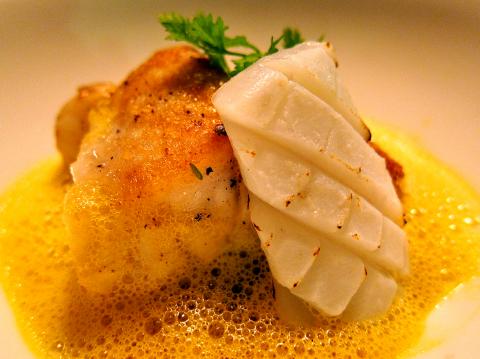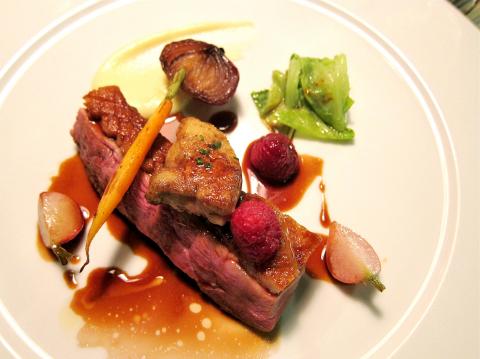Located near Da-an Forest Park, the newly opened L’Air Cafe Neo Bistro offers nouvelle cuisine made with seasonal ingredients. Head chef Dana Yu (游育甄) says that after 10 years of working as a chef at top restaurants including Justin’s Signatures and L’Atelier Joel Robuchon, she was ready to strike out on her own. Yu opened L’Air Cafe last month with her friend Lin Shu-chen (林淑真), the owner of nearby cafes Bunny Listens to the Music (兔子聽音樂) and Boute de Bijou (珠寶盒).
Yu’s goal is to showcase fresh ingredients by crafting the best balances of flavors and textures using French cooking methods.
“If I can create something in just three steps, then I will use just three steps,” Yu says. “I want to make sure each ingredient stands out.”

Photo: Catherine Shu, Taipei Times
A la carte options are available, but L’Air Cafe’s set menu (NT$2,200 plus 10 percent service charge) not only offers the best value, but allows diners to experience a carefully calibrated sequence of dishes designed to engage all of the senses.
Last weekend’s menu prominently featured seafood, which L’Air Cafe buys daily from sellers in Keelung’s fishing ports. One of our first dishes was a crisp spear of white asparagus topped with tender slices of steamed abalone and a smooth and creamy sauce. A scallop salad also showcased a tantalizing medley of flavors. It featured a paper-thin slice of phyllo pastry layered with caramelized onions lightly drizzled with sherry vinegar, large scallops, thin slices of bamboo shoots, arugula leaves, cilantro and prosciutto. Our final seafood dish was fresh fish and lightly seared squid served in a white wine and clam sauce.
The highlight of our meal and main course was duck breast from “cherry” ducks, a breed raised in Yilan County. The meat was slow-roasted to lock in moisture and each serving was plated with duck liver that had been marinated in milk before being lightly simmered. The richness of the meat was complemented by a slightly tart red wine and raspberry sauce. The sublime duck cut like butter and melted in the mouth.

Photo: Catherine Shu, Taipei Times
Our desserts included a refreshing lemon granita with coconut milk, tiramisu and pate de fruit and chocolate served with tea. L’Air Cafe offers a selection of red and white wines from Italy, Spain, France and New Zealand and California, as well as Champagne and sparkling wine. Their house sauvignon blanc paired very well with the set menu’s seafood courses.
L’Air Cafe’s service is excellent. Though my companion and I were seated in a small alcove out of the main counter’s sightline, we never had trouble getting the attention of the server. The pacing of our dishes needed some fine-tuning: our amuse-bouche and seafood courses arrived very quickly, but there was a slight lull before our duck was served. Our waitress offered us constant refills of toasted French bread and herbed butter as we waited, however, and kept our water glasses full.
L’Air Cafe’s menu changes weekly based on what ingredients are available. Dishes can be customized for diners who have dietary requirements. Yu says that since the restaurant’s soft opening at the end of last month, she has created eight different set menus to make sure repeat customers are satisfied.

Taiwan Power Co (Taipower, 台電) and the New Taipei City Government in May last year agreed to allow the activation of a spent fuel storage facility for the Jinshan Nuclear Power Plant in Shihmen District (石門). The deal ended eleven years of legal wrangling. According to the Taipower announcement, the city government engaged in repeated delays, failing to approve water and soil conservation plans. Taipower said at the time that plans for another dry storage facility for the Guosheng Nuclear Power Plant in New Taipei City’s Wanli District (萬里) remained stuck in legal limbo. Later that year an agreement was reached

What does the Taiwan People’s Party (TPP) in the Huang Kuo-chang (黃國昌) era stand for? What sets it apart from their allies, the Chinese Nationalist Party (KMT)? With some shifts in tone and emphasis, the KMT’s stances have not changed significantly since the late 2000s and the era of former president Ma Ying-jeou (馬英九). The Democratic Progressive Party’s (DPP) current platform formed in the mid-2010s under the guidance of Tsai Ing-wen (蔡英文), and current President William Lai (賴清德) campaigned on continuity. Though their ideological stances may be a bit stale, they have the advantage of being broadly understood by the voters.

In a high-rise office building in Taipei’s government district, the primary agency for maintaining links to Thailand’s 108 Yunnan villages — which are home to a population of around 200,000 descendants of the Chinese Nationalist Party (KMT) armies stranded in Thailand following the Chinese Civil War — is the Overseas Community Affairs Council (OCAC). Established in China in 1926, the OCAC was born of a mandate to support Chinese education, culture and economic development in far flung Chinese diaspora communities, which, especially in southeast Asia, had underwritten the military insurgencies against the Qing Dynasty that led to the founding of

It’s fairly well established that strength training is helpful at every age: as well as building muscle, it strengthens tendons and ligaments, increases bone density and seems to have protective effects against everything from osteoporosis to dementia. But a new study based on data collected over two decades in Rio de Janeiro, Brazil, suggests that another physical attribute might be just as important — and it’s one that declines even faster than strength as the years go by. The good news? It might also be less uncomfortable, and even slightly safer, to improve. Also, it will probably make you better